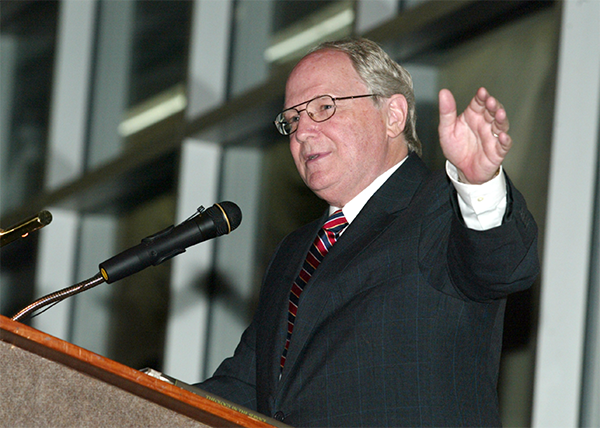
Beeson Divinity School professor emeritus Fisher Humphreys spent three days with different audiences exploring The Purposes of God for the Samford Religion Department’s 2018 Holley-Hull Lectures, Oct. 16-18.
In the opening lecture on Samford’s campus, Humphreys acknowledged the “audacious” challenge he set for himself in selecting his topic. But since the topic spans all of human history it can hardly be avoided. “Apparently, human beings have a deep need to understand the world and their place in it,” he said.
Humphreys, a prolific author and scholar who retired from Samford in 2008, called on his wide-ranging readings to relate how other authors influenced the human search for meaning in the last century. The secular philosophers, psychiatrists, physicists and sociologists he quoted responded to the fundamental question of human life in ways ranging from resigned despair to a personalized, individual hopefulness. Among these, he noted that psychologist Stephen Pinker offered “as elegant an answer as any I know from the point of view of an atheist” when a student asked him why she should live if she is nothing more or less than a set of biochemical processes. Pinker responded:
“You have reason, and can use it. You can flourish. Evolution has endowed you with sympathy, so that you can like, love, respect help, and show kindness. You can foster the welfare of other sentient beings by enhancing life, knowledge, freedom, abundance, safety, beauty and peace.”
This answer encourages the questioner “to be content with meaning human beings construct, and not to ask for anything more,” Humphreys said. “But others are searching for meaning in a larger sense, beyond what they can create for themselves. They want to know if there is a transcendent meaning that has been given rather than constructed. And this, of course, brings us to religion.”
If it is possible to discover meaning in life rather than create it, that suggests a purpose for creation and points to God. Christians often describe God’s purpose as a mystery, or to save souls or to be glorified. Humphreys proposed a fourth purpose to illuminate the other three:
“God's purpose is to create a family of people to be the people of God. These people freely receive God’s love into their lives, and learn to love God with all their hearts and to love their neighbors as themselves. In this world and in the life to come, they share together a Koinonia, or fellowship, of mutual love and trust, happiness and the worship of God. They do this in a world characterized by justice and peace.”
Humphreys explained that this fourth purpose deepens the mystery of creation, but helps explain why God wishes to save souls, and elevates glorification above the cosmic self-centeredness that alienates many people who are searching for meaning. “When human beings recognize that it is God’s purpose for them to be God’s own people, they become aware of how generous God has been to create them and love them despite their sometimes-unlovely behavior,” Humphreys said. “Naturally they worship God. Given the purpose that God is carrying out in our world, it would be unnatural not to worship God.”
Humphreys said Christians can find in the story of Jesus their “clearest and fullest understanding of the purposes of God.” “I believe that Jesus’s teachings about making a covenant, about the kingdom of God, about the fatherhood of God, and about the priority of love in human life, all display the fact that God’s purpose is to create a community of people to be the people of God,” he said.
In First Timothy 4:10 (“That is why we labor and strive, because we have put our hope in the living God, who is the Savior of all people, and especially of those who believe”) Humphreys finds further hope for a common, discoverable meaning in human life as opposed to an individual meaning that must be created. “In this understanding,” he said, “God’s purpose of creating a family of people to be God’s own is truly good news for everyone.”
